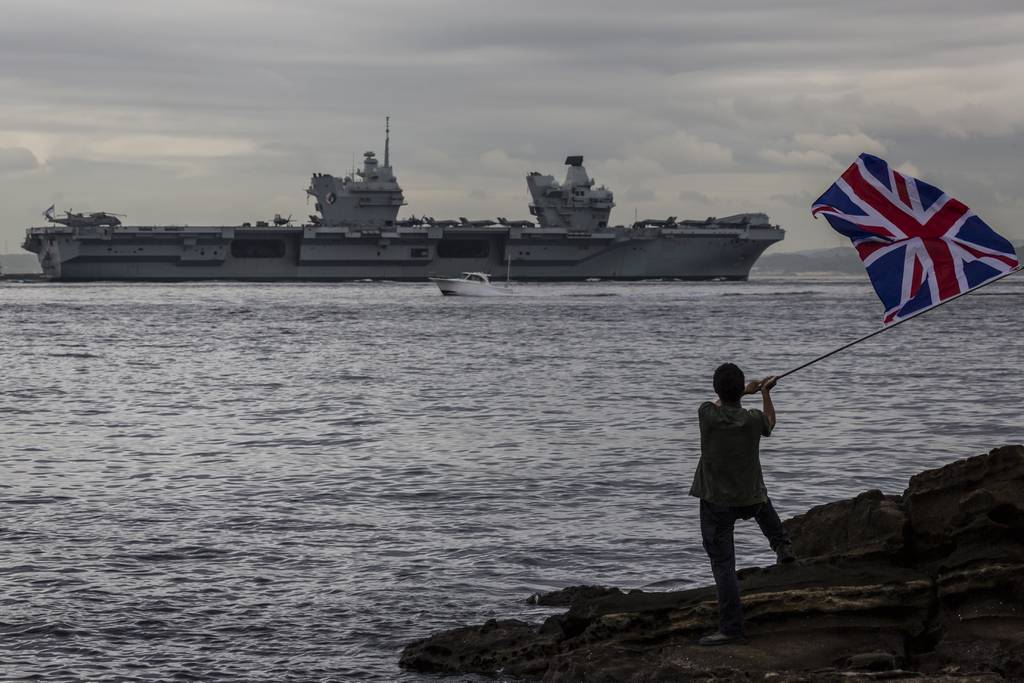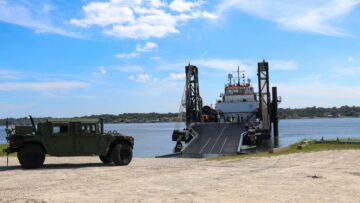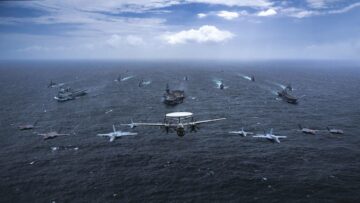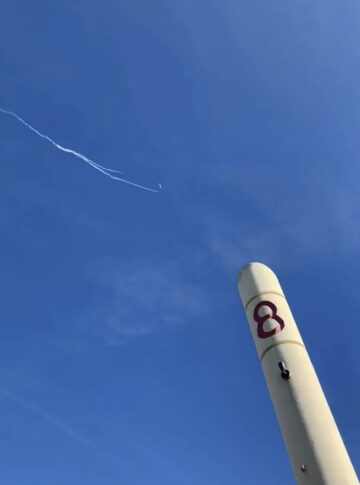
LONDON — Britain should either increase it’s military presence in the Indo-Pacific or curb its ambitions in the region, according to the parliamentary Defence Committee.
The region is critical to Britain’s economic and security interests, and the government’s tilt toward the Indo-Pacific comes at a time of growing tension there involving a growing Chinese force.
“With only a modest presence compared to allies, little to no fighting force in the region, and little by way of regular activity, UK [Ministry of] Defence’s tilt to the Indo-Pacific is far from being achieved,” the committee said in a report to be released Oct. 24 and seen by Defense News.
“If we aspire to play any significant role in the Indo-Pacific this would need a major commitment of cash, equipment and personnel. Without this, the UK may need to curb its ambitions in the region,” the committee determined.
The government had announced a pronounced pivot toward the Indo-Pacific in a 2021 integrated review of Britain’s global defense, security and economic strategy. But with a refresh of the strategic review concluded in March, the government has now said the regional refocus is achieved.
Not so in terms of defense, the committee has found.
“The UK Government’s future strategy for the Indo-Pacific is still unclear. Therefore, we urge the Government to create a single, cross-government Indo-Pacific strategy, and within this, the Ministry of Defence should include a comprehensive defence and diplomatic response to the growing threat posed by China,” the report said.
The report also noted Britain has a minor military presence in the region but must bolster its military resources there or potentially rebalance existing ones if the country wants to play a significant role. But it’s unclear how — amid Russia’s war against Ukraine and the British government’s determination that the Atlantic and Europe remain priorities — the government could reallocate defense funds or capabilities toward the Indo-Pacific.
“Despite the government’s insistence that the Indo-Pacific tilt has been ‘delivered,’ our report found that the reality falls short of the rhetoric,” said the Defence Committee’s vice chair, John Spellar.
“We currently have no real military capabilities in the Indo-Pacific and are unlikely to be able to contribute significantly in the event of hostilities in the region. If we are serious about building up our presence — and if we are able to do so without disrupting our commitments elsewhere — we must allocate resources to efforts in the region, alongside our allies and partners,” he added.
Current British assets in the region are a base in the British Indian Ocean Territory; fuel installations in Singapore; and an Army garrison in Brunei comprising a Gurkha battalion; Puma helicopters; and engineers with riverine craft and two offshore patrol vessels who have no single base but move around the area.
“It appears that China is preparing to confront Taiwan. In response to this, the U.K. government and armed forces must ensure that we are prepared to respond to a variety of potential hostilities, from gray zone activities to outright conflict,” Spellar said, using a term for offensive operations that fall below the threshold of warfare. “This needs to be more than just words, and must be treated with focus and urgency.”
Ben Barry, a senior fellow for land warfare at the London-based International Institute for Strategic Studies think tank, described the government’s defense strategy for the Indo-Pacific as opaque.
“I would assess U.K. military strategy to the region as having a degree of ‘strategic ambiguity’: reassuring and supporting our friends in the region but not being explicit about potential U.K. responses to any flashpoint turning into armed conflict,” the analyst told Defense News.
Barry, who provided evidence to the committee, said amid “existing policy priorities, sending any more [to the Indo-Pacific] would depend on [the] European and Middle Eastern security situation allowing significant force elements to be spared.”
Notably, he added, existing plans for deployments are not set in stone.
“Announced plan to send a carrier strike group in 2025 cannot be guaranteed. Nor can declared plans to base a submarine in Australia or a frigate in the region later in the decade be guaranteed.” he said. “The existing small commitment in Brunei and the OPVs appear to be sustainable over the long term. The additional littoral group that is planned may or may not be sustainable; it’s already been diverted by the Gaza war and could be needed for any wider Middle East crisis, particularly if the war spreads.”
Since its 2021 defense review, Britain has bolstered its military presence in the Indo-Pacific, primarily with maritime assets. That involved the deployment of a carrier strike group in 2021 led by the Royal Navy’s HMS Queen Elizabeth. A littoral response group was to visit this year, but those vessels appear to have been diverted to the Eastern Mediterranean in the wake of the Israel-Hamas war. Another carrier strike group deployment is to follow in 2025.
The government is also working with the U.S. on the trilateral security arrangement AUKUS that will see Australia acquire nuclear-powered submarines. Included in that deal is an agreement for a regular deployment of a Royal Navy Astute-class attack submarine to Australia from 2026 onward.
Andrew Chuter is the United Kingdom correspondent for Defense News.
- SEO Powered Content & PR Distribution. Get Amplified Today.
- PlatoData.Network Vertical Generative Ai. Empower Yourself. Access Here.
- PlatoAiStream. Web3 Intelligence. Knowledge Amplified. Access Here.
- PlatoESG. Carbon, CleanTech, Energy, Environment, Solar, Waste Management. Access Here.
- PlatoHealth. Biotech and Clinical Trials Intelligence. Access Here.
- Source: https://www.defensenews.com/global/europe/2023/10/23/britain-is-more-bark-than-bite-in-indo-pacific-lawmakers-warn/
- :has
- :is
- :not
- $UP
- 14
- 2019
- 2021
- 2025
- 2026
- 24
- 70
- a
- Able
- About
- According
- achieved
- acquire
- activities
- activity
- added
- Additional
- against
- Agreement
- allocate
- Allowing
- alongside
- already
- also
- ambitions
- Amid
- an
- analyst
- and
- announced
- Another
- any
- appear
- appears
- ARE
- AREA
- armed
- Army
- around
- arrangement
- AS
- aspire
- assess
- Assets
- At
- attack
- Australia
- base
- BE
- been
- being
- below
- bolster
- britain
- British
- Building
- but
- by
- CAN
- cannot
- capabilities
- Cash
- Chair
- Chart
- China
- chinese
- comes
- commitment
- commitments
- committee
- compared
- comprehensive
- comprising
- concluded
- conflict
- contribute
- could
- country
- craft
- create
- crisis
- critical
- curb
- Currently
- deal
- decade
- defence
- Defense
- Degree
- deployment
- deployments
- described
- determination
- determined
- diplomatic
- do
- during
- East
- eastern
- Economic
- efforts
- either
- elements
- elsewhere
- Engineers
- ensure
- equipment
- Europe
- European
- Event
- evidence
- Exercise
- existing
- Fall
- Falls
- far
- fellow
- fighting
- Focus
- follow
- For
- Force
- Forces
- found
- friends
- from
- Fuel
- future
- Global
- Government
- gray
- Group
- Growing
- guaranteed
- had
- Have
- having
- he
- helicopters
- How
- HTTPS
- if
- images
- in
- include
- included
- Increase
- Indian
- Institute
- integrated
- interests
- International
- into
- involved
- involving
- ITS
- Japan
- John
- joint
- jpg
- just
- Kingdom
- Land
- later
- lawmakers
- Led
- little
- Long
- major
- March
- Maritime
- May..
- Mediterranean
- Middle
- Middle East
- Military
- ministry
- minor
- modest
- more
- move
- must
- Need
- needed
- needs
- news
- no
- nor
- noted
- now
- ocean
- Oct
- of
- offensive
- Officer
- on
- ones
- only
- opaque
- Operations
- or
- our
- outright
- over
- Pacific
- Pacific Ocean
- Parliamentary
- particularly
- partners
- Personnel
- Pivot
- plan
- planned
- plans
- plato
- Plato Data Intelligence
- PlatoData
- Play
- points
- policy
- posed
- potential
- potentially
- prepared
- preparing
- presence
- primarily
- pronounced
- provided
- PUMA
- queen
- Queen Elizabeth
- real
- Reality
- reassuring
- rebalance
- region
- regional
- regular
- released
- remain
- report
- Resources
- Respond
- response
- responses
- review
- Role
- royal
- s
- Said
- security
- see
- seen
- send
- sending
- senior
- serious
- set
- Short
- should
- significant
- significantly
- Singapore
- single
- situation
- small
- So
- Spreads
- Still
- STONE
- Strategic
- strategic review
- Strategy
- strike
- studies
- Supporting
- sustainable
- Taiwan
- tank
- term
- terms
- territory
- than
- that
- The
- The Area
- the UK
- the United Kingdom
- There.
- therefore
- Think
- think tank
- this
- this year
- those
- threat
- threshold
- time
- to
- told
- toward
- treated
- Turning
- two
- U.K.
- U.K. government
- u.s.
- U.S. Navy
- Uk
- unclear
- United
- United Kingdom
- unlikely
- urgency
- using
- variety
- vessels
- vice
- Visit
- Wake
- wants
- war
- was
- Way..
- we
- while
- WHO
- wider
- will
- with
- within
- without
- words
- working
- would
- year
- zephyrnet












